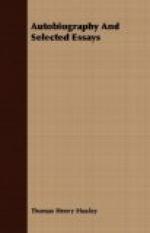Yet it is a very plain and elementary truth, that the life, the fortune, and the happiness of every one of us, and, more or less, of those who are connected with us, do depend upon our knowing something of the rules of a game infinitely more difficult and complicated than chess. It is a game which has been played for untold ages, every man and woman of us being one of the two players in a game of his or her own. The chessboard is the world, the pieces are the phenomena of the universe, the rules of the game are what we call the laws of Nature. The player on the other side is hidden from us. We know that his play is always fair, just, and patient. But also we know, to our cost, that he never overlooks a mistake, or makes the smallest allowance for ignorance. To the man who plays well, the highest stakes are paid, with that sort of overflowing generosity with which the strong shows delight in strength. And one who plays ill is checkmated—without haste, but without remorse.
My metaphor will remind some of you of the famous picture in which Retzsch [53] has depicted Satan playing at chess with man for his soul. Substitute for the mocking fiend in that picture a calm, strong angel who is playing for love, as we say, and would rather lose than win—and I should accept it as an image of human life.
Well, what I mean by Education is learning the rules of this mighty game. In other words, education is the instruction of the intellect in the laws of Nature, under which name I include not merely things and their forces, but men and their ways; and the fashioning of the affections and of the will into an earnest and loving desire to move in harmony with those laws. For me, education means neither more nor less than this. Anything which professes to call itself education must be tried by this standard, and if it fails to stand the test, I will not call it education, whatever may be the force of authority, or of numbers, upon the other side.
It is important to remember that, in strictness, there is no such thing as an uneducated man. Take an extreme case. Suppose that an adult man, in the full vigour of his faculties, could be suddenly placed in the world, as Adam is said to have been, and then left to do as he best might. How long would he be left uneducated? Not five minutes. Nature would begin to teach him, through the eye, the ear, the touch, the properties of objects. Pain and pleasure would be at his elbow telling him to do this and avoid that; and by slow degrees the man would receive an education which, if narrow, would be thorough, real, and adequate to his circumstances, though there would be no extras and very few accomplishments.
And if to this solitary man entered a second Adam or, better still, an Eve, a new and greater world, that of social and moral phenomena, would be revealed. Joys and woes, compared with which all others might seem but faint shadows, would spring from the new relations. Happiness and sorrow would take the place of the coarser monitors, pleasure and pain; but conduct would still be shaped by the observation of the natural consequences of actions; or, in other words, by the laws of the nature of man.




